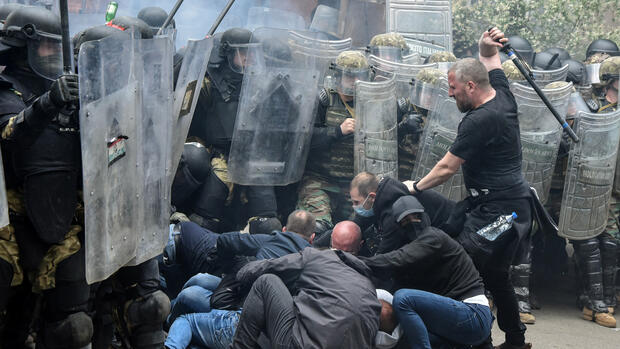Around 25 soldiers from Italy and Hungary suffered broken bones and burns. According to eyewitnesses, the police, made up of ethnic Albanians, used tear gas against the protests.
(Photo: Reuters)
Leposavic, Belgrade Numerous soldiers of the NATO-led Kosovo Protection Force KFOR were injured in clashes in the Serb-inhabited north of Kosovo. Several uniformed soldiers from Italy and Hungary suffered fractures and burns in attacks by militant Serbs in the village of Zvecan, the KFOR command said on Monday evening in Pristina.
Italian Foreign Minister Antonio Tajani spoke on Twitter of fourteen injured Italians from the KFOR contingent. Three of them suffered serious injuries, but are not in mortal danger. 20 Hungarian KFOR soldiers were also among the injured, wrote the Budapest news portal hvg.hu, citing diplomatic circles.
NATO strongly condemned the attacks on KFOR troops. “Such attacks are totally unacceptable. The violence must stop immediately. We call on all sides to refrain from actions that further escalate tensions and to engage in dialogue,” a spokeswoman for the military alliance said. KFOR will take all necessary measures to maintain a secure environment.
Italy’s Prime Minister Giorgia Meloni also condemned the attack. “What is happening here is absolutely unacceptable and irresponsible. We will not tolerate any further attacks on KFOR,” she said on Monday evening, according to a statement.
Meanwhile, neighboring Serbia has put its armed forces on high combat readiness, Defense Minister Milos Vucevic said. Serbian President Aleksandar Vucic had already ordered combat readiness on Friday, albeit initially at a lower level.
The clashes occurred on Monday afternoon when militant Serbs protested against the appointment of new mayors in Zvecan and other municipalities. KFOR soldiers securing the municipal office in Zvecan broke up the protest, which turned violent, local media reported. They used stun grenades and tear gas.
The crowd in turn threw stones, incendiary devices, bottles and other objects at them. A Serb was injured by gunfire, the hospital in the nearby town of Mitrovica said. Another 52 Serbs were hospitalized there with injuries, the hospital said.
The approximately 300 KFOR soldiers had previously taken up positions in combat gear in front of the municipal office in Zvecan on Monday morning. At the same time, a large number of Serbian demonstrators had gathered in front of the official building. The KFOR troops should secure the office building instead of the Kosovan special police. This had gained access to the municipal office last Friday, which had already triggered violent protests by militant Serbs.
Many Serbs boycotted local elections beforehand
The police had escorted the new mayor, an Albanian who wanted to take office. Serbs are also protesting in two other places in northern Kosovo, where Albanian mayors have also taken over. The three were elected in April, with almost all Serbs boycotting the election. That is why the election winners come from Albanian parties. The previous Serbian mayors resigned their positions in November 2022 in protest against the policies of the Kosovar government.
The escalation came on Monday when the Serbian crowd in Zvecan refused to let the Kosovar police vehicles that were still there drive away. The KFOR squad then broke up the meeting.
Kosovo, which is now almost exclusively inhabited by Albanians, declared its independence in 2008. Serbia does not recognize the statehood of its former province and demands its return. At the same time, it repeatedly stirs up tensions among the Serb population of Kosovo. In 1999, Belgrade responded to an armed uprising by Kosovar Albanians by expelling and mass killings of civilians.
NATO then intervened with bombing and forced the withdrawal of the Serbian security forces from Kosovo. A UN Security Council decision in the same year tasked KFOR with ensuring security in Kosovo.
More: Ambiguous partner: Serbia wants to join the EU – but many Serbs feel connected to Russia
